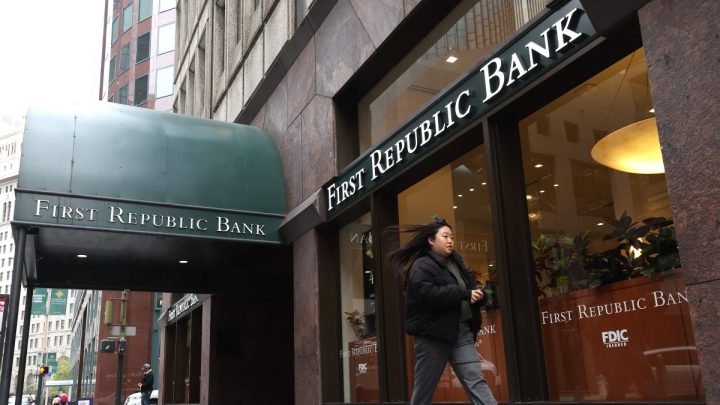
For JPMorgan, loss sharing sweetened its deal to buy First Republic Bank
For JPMorgan, loss sharing sweetened its deal to buy First Republic Bank

In the wee hours of this morning, JPMorgan Chase finalized its deal with the Federal Deposit Insurance Corporation to buy First Republic Bank. The FDIC had seized control of the bank over the weekend and auctioned it off. JPMorgan won that auction, and it’s paying a cool $10.6 billion for the bank, but not without some guarantees.
JP Morgan Chase CEO Jamie Dimon said the deal to rescue First Republic only modestly benefits his bank.
“They are booking a $2.6 billion gain up front,” said David Chiaverini, a managing director at Wedbush Securities. “And then they are going to be generating 500 million incremental earnings annually going forward.”
The bank also gets a bunch of new affluent customers, said Tiffani Montez, a principal analyst at Insider Intelligence.
“It’s a quick way for JPMorgan Chase to increase their market share,” she said.
On the downside, restructuring will cost JPMorgan Chase about $2 billion, and the bank said it’ll also have to repay $25 billion to other banks that tried to keep First Republic afloat. So for all that, the bank got a deal sweetener. The FDIC agreed to shoulder the bulk of any losses from certain mortgages and commercial loans that would come with First Republic.
“I think it was extremely important to do that,” said David George, senior bank analyst with Baird. He said many of the loans JPMorgan Chase would acquire do not offer attractive returns, and instead would be “Well below market rate.”
Having the FDIC share the burden of losses makes the below market returns more palatable. Patricia McCoy, a professor of law at Boston College Law School, said there may be bigger concerns with the loans themselves. Take commercial loans, for example.
“There’s a lot of talk on the street that commercial loans to finance office space in the future may go into default because there are so many office vacancies,” she said.
McCoy also said a lot of the residential mortgages JPMorgan Chase would take on are interest-only mortgages, where payments suddenly jump after a few years.
“Interest-only mortgages have a much higher default rate than ordinary fixed-rate mortgages,” she said.
If those concerns pan out, having the FDIC shoulder some of that risk would offer substantial protection.
There’s a lot happening in the world. Through it all, Marketplace is here for you.
You rely on Marketplace to break down the world’s events and tell you how it affects you in a fact-based, approachable way. We rely on your financial support to keep making that possible.
Your donation today powers the independent journalism that you rely on. For just $5/month, you can help sustain Marketplace so we can keep reporting on the things that matter to you.












